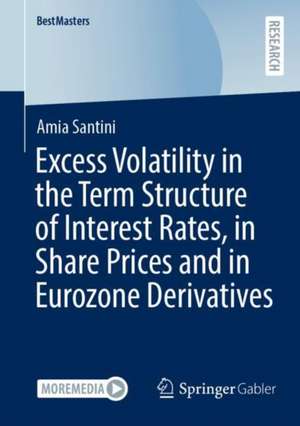Excess Volatility in the Term Structure of Interest Rates, in Share Prices and in Eurozone Derivatives: BestMasters
Autor Amia Santinien Limba Engleză Paperback – 4 mai 2022
Din seria BestMasters
-
 Preț: 362.32 lei
Preț: 362.32 lei - 13%
 Preț: 367.41 lei
Preț: 367.41 lei -
 Preț: 364.14 lei
Preț: 364.14 lei - 5%
 Preț: 403.96 lei
Preț: 403.96 lei -
 Preț: 377.18 lei
Preț: 377.18 lei -
 Preț: 367.05 lei
Preț: 367.05 lei - 13%
 Preț: 364.57 lei
Preț: 364.57 lei - 13%
 Preț: 366.14 lei
Preț: 366.14 lei - 13%
 Preț: 368.35 lei
Preț: 368.35 lei -
 Preț: 391.41 lei
Preț: 391.41 lei - 13%
 Preț: 367.41 lei
Preț: 367.41 lei -
 Preț: 311.76 lei
Preț: 311.76 lei -
 Preț: 396.86 lei
Preț: 396.86 lei -
 Preț: 406.59 lei
Preț: 406.59 lei -
 Preț: 365.66 lei
Preț: 365.66 lei -
 Preț: 394.31 lei
Preț: 394.31 lei - 13%
 Preț: 365.83 lei
Preț: 365.83 lei - 13%
 Preț: 396.42 lei
Preț: 396.42 lei - 20%
 Preț: 366.22 lei
Preț: 366.22 lei -
 Preț: 364.14 lei
Preț: 364.14 lei -
 Preț: 367.05 lei
Preț: 367.05 lei -
 Preț: 346.23 lei
Preț: 346.23 lei -
 Preț: 365.59 lei
Preț: 365.59 lei -
 Preț: 392.13 lei
Preț: 392.13 lei -
 Preț: 251.34 lei
Preț: 251.34 lei - 20%
 Preț: 292.10 lei
Preț: 292.10 lei -
 Preț: 404.05 lei
Preț: 404.05 lei -
 Preț: 393.58 lei
Preț: 393.58 lei -
 Preț: 393.58 lei
Preț: 393.58 lei -
 Preț: 344.87 lei
Preț: 344.87 lei -
 Preț: 410.77 lei
Preț: 410.77 lei -
 Preț: 411.75 lei
Preț: 411.75 lei -
 Preț: 379.30 lei
Preț: 379.30 lei -
 Preț: 411.32 lei
Preț: 411.32 lei -
 Preț: 412.89 lei
Preț: 412.89 lei -
 Preț: 377.73 lei
Preț: 377.73 lei -
 Preț: 378.12 lei
Preț: 378.12 lei -
 Preț: 412.51 lei
Preț: 412.51 lei -
 Preț: 481.79 lei
Preț: 481.79 lei -
 Preț: 377.18 lei
Preț: 377.18 lei -
 Preț: 480.06 lei
Preț: 480.06 lei -
 Preț: 376.04 lei
Preț: 376.04 lei -
 Preț: 382.95 lei
Preț: 382.95 lei -
 Preț: 377.95 lei
Preț: 377.95 lei -
 Preț: 412.68 lei
Preț: 412.68 lei -
 Preț: 376.80 lei
Preț: 376.80 lei -
 Preț: 380.45 lei
Preț: 380.45 lei -
 Preț: 410.17 lei
Preț: 410.17 lei -
 Preț: 410.94 lei
Preț: 410.94 lei -
 Preț: 380.63 lei
Preț: 380.63 lei
Preț: 572.95 lei
Preț vechi: 674.07 lei
-15% Nou
Puncte Express: 859
Preț estimativ în valută:
109.64€ • 115.29$ • 90.59£
109.64€ • 115.29$ • 90.59£
Carte tipărită la comandă
Livrare economică 17 aprilie-01 mai
Preluare comenzi: 021 569.72.76
Specificații
ISBN-13: 9783658374495
ISBN-10: 3658374497
Pagini: 77
Ilustrații: VII, 77 p.
Dimensiuni: 148 x 210 mm
Greutate: 0.11 kg
Ediția:1st ed. 2022
Editura: Springer Fachmedien Wiesbaden
Colecția Springer Gabler
Seria BestMasters
Locul publicării:Wiesbaden, Germany
ISBN-10: 3658374497
Pagini: 77
Ilustrații: VII, 77 p.
Dimensiuni: 148 x 210 mm
Greutate: 0.11 kg
Ediția:1st ed. 2022
Editura: Springer Fachmedien Wiesbaden
Colecția Springer Gabler
Seria BestMasters
Locul publicării:Wiesbaden, Germany
Cuprins
1 Abstract.- 2 Introduction.- 3 Chapter I: Literature on the subject of excess volatility.- 4 Chapter II: Excess volatility beyond discount rates.- 5 Chapter III: Evidence of excess volatility in the Eurozone market.- 6 Conclusions.
Notă biografică
Amia Santini is a PhD student in statistics at the University of Bologna (Italy). Her work focusses on the field of green finance.
Textul de pe ultima copertă
The phenomenon of excess volatility in the context of share prices and of the term structure of interest rates has been documented by the existing literature, highlighting the limitations of traditional models of rational expectations and of reliance on the efficient market hypothesis. The data violates the bounds on volatility that are derived from them. Amia Santini studies the possible shortcomings of the methodologies used to uncover those inconsistencies, and the potential explanations of the observed phenomenon that can be considered in line with the rational expectation framework. She focuses on a relatively newer field of study: derivative instruments. Previous results of excess volatility, recovered with a worldwide focus, are presented and an empirical analysis is performed to assess whether a similar outcome would be obtained in the Eurozone market. The exploration of financial information that falls underneath the risk-neutral measure, such as derivative prices, reduces theimportance of time-varying discount rates as a potential explanation of excess volatility. In fact, the martingale measure already incorporates all potential variation in risk premia, which is the main driver of changes in discount rates. This opens the door to different and innovative prospects, and specific attention is paid to a new model for investor behaviour, that of natural expectations.
About the Author
Amia Santini is a PhD student in statistics at the University of Bologna (Italy). Her work focusses on the field of green finance.
